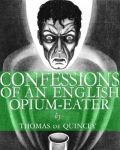
 The SFFaudio Podcast #138 – The Crawling Chaos by Winifred V. Jackson and H.P. Lovecraft, read by Wayne June. This is a complete and unabridged reading of the short story (21 Minutes) followed by a discussion of it (by Jesse, Tamahome, Jim Moon and Wayne June). Here’s the ETEXT.
The SFFaudio Podcast #138 – The Crawling Chaos by Winifred V. Jackson and H.P. Lovecraft, read by Wayne June. This is a complete and unabridged reading of the short story (21 Minutes) followed by a discussion of it (by Jesse, Tamahome, Jim Moon and Wayne June). Here’s the ETEXT.
“In The Crawling Chaos the narrator flees inland, taking his adjectives with him.” -L. Sprague de Camp (from Lovecraft: A Biography)
Talked about on today’s show:
Wayne June is still alive!, first impressions of The Crawling Chaos, Wikipedia’s plot summary of The Crawling Chaos, dream logic, an opium vision, the tripiness, the philosophy behind The Crawling Chaos, The Haunted Palace by Edgar Allan Poe, the self as a haunted palace, Poe is so 19th century, The Raven, The Fall Of The House Of Usher, entropy, there is no meaning in this uncaring universe, “and all the planets mourned”, you’d need a lot of Prozac (or opium) to go through a life like that, the catharsis of apocalypse, a cosmic apocalypse, the plot is a jumble of junk, the biblical echoes, “only the gods reside there” (in Teloe), a very old testament vibe, “lest you turn into a pillar of salt”, the protagonist is us (mankind), Lovecraft’s recurring themes, the ordinary man who swaps places with another, The Shadow Out Of Time, Polaris, Beyond The Wall Of Sleep, transcendental mind-swap stories, the story was a pseudonymous collaboration between Elizabeth Berkley (aka Winifred V. Jackson) and Louis Theobald, Jun. (aka H.P. Lovecraft), Nyarlathotep, “send me some money”, a lot of dross with a powerful effect, “the year of the plague”, the “oriel window” is an eyeball!, “calm down Howard”, “he’s in his own brain”, who or what is “the crawling chaos”?, the ocean pounding is his heart beating, “We’re all doomed!”, what is the crawling chaos?, S.T. Joshi, Rudyard Kipling, the peninsular beach house, Tiger Tiger (from The Jungle Book), The Tyger by William Blake, is the beautiful youth Mowgli?, who are “they”?, a fawn faced youth, Weena from H.G. Wells’ The Time Machine, did Winifred read The Time Machine before sleep?, what is the meaning of “Teloe”? is it teleology, reaching for meaning or purpose and losing it, Amber and Chalcedony, pleasure barges bound for blossomy Cytheron, Liquid Gold, Lord Dunsany, the heavenly host, the destruction of the physical (the corpse-like clay), black clouds like vultures, Supernatural Horror In Literature by H.P. Lovecraft, “the oldest and strongest emotion of mankind is fear”, City In The Sea by Edgar Allan Poe, opium addiction, why opium?, Confessions Of An English Opium-Eater by Thomas De Quincey, Charles Baudelaire, a waking dream, if the story was written in the 1960s…, LSD, morphine and Morpheus (dream), a waking dream, Aldous Huxley, Timothy Leary, The Doors Of Perception, out of Plato’s cave, Philip K. Dick, mindset and environment, mescaline, dreams vs. drug trips, journeys into the unconscious, Mouthpiece by Edward Wellen, decoding the death ravings of Dutch Schultz (HERE), William Burroughs, Robert Anton Wilson, “French Canadian Bean Soup”, stream of unconsciousness, Frances vs. French people, “swimming through New York”, The Librarian TV series, “perfectly ordinary strange adventures”, puns are big for the subconscious, Samuel R. Delany, Groucho Marx.


Posted by Jesse Willis

 In his latest Science Fiction Book Review Podcast, #173, Luke Burrage reviews the new audiobook of The Simulacra, one of the many previously unrecorded PKD novels from Brilliance Audio.
In his latest Science Fiction Book Review Podcast, #173, Luke Burrage reviews the new audiobook of The Simulacra, one of the many previously unrecorded PKD novels from Brilliance Audio. 










 Armor
Armor